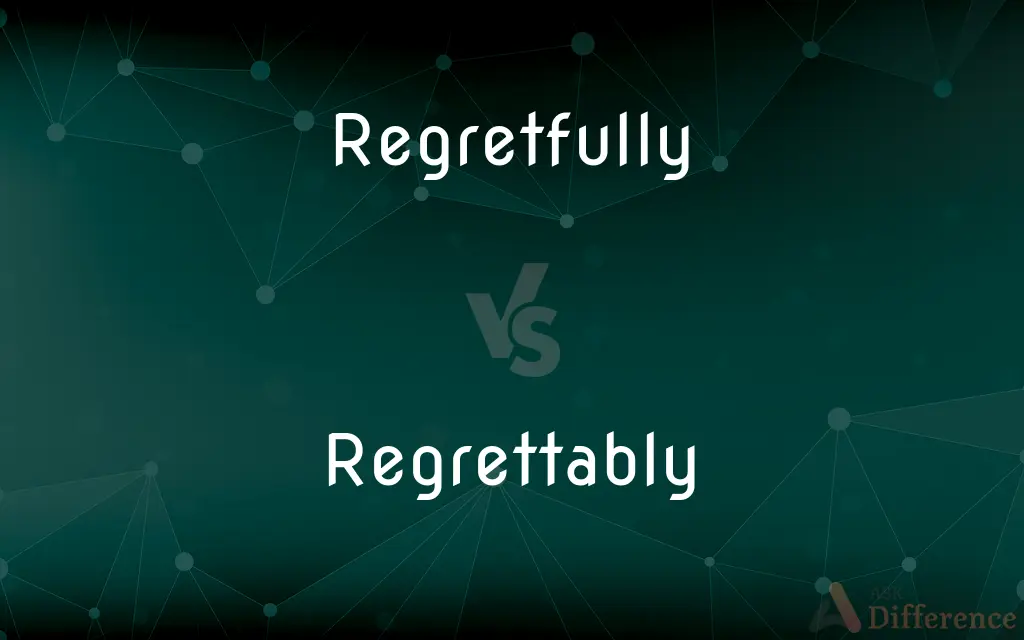Regretfully vs. Regrettably — What's the Difference?
By Urooj Arif & Maham Liaqat — Updated on March 4, 2024
Regretfully conveys personal remorse; regrettably denotes something is regrettable or unfortunate. Both express regret but from different perspectives.

Difference Between Regretfully and Regrettably
Table of Contents
ADVERTISEMENT
Key Differences
Regretfully is used to express personal sorrow or remorse over an action or situation. It indicates a personal connection to the regret and is often used in personal statements. Whereas regrettably is used to describe situations or events that are unfortunate or deserving of regret, but without implying personal responsibility or emotion. It's more detached, referring to the nature of the situation rather than the speaker's feelings.
When someone says they are acting or speaking "regretfully," it suggests a depth of personal feeling and direct involvement with the regretful action. It conveys a sense of personal apology or remorse. On the other hand, "regrettably" is used to acknowledge that something is unfortunate without expressing personal remorse. It's often used to introduce bad news or decisions that are seen as negative but necessary.
The usage of regretfully often implies a wish to undo the regretted action or decision, highlighting the speaker's personal desire for a different outcome. In contrast, regrettably is typically used in formal or official contexts to denote that an outcome, though unfortunate, is beyond one's control or is a matter of fact, without indicating a personal wish to change it.
Regretfully can be seen in personal communications, such as letters, emails, or speeches, where the speaker wants to emphasize their personal regret. Regrettably, however, is more likely to be found in official announcements, reports, or news articles, where an objective tone is required to convey that something is lamentable.
The choice between regretfully and regrettably hinges on the speaker's intention: to express personal remorse or to describe a situation as unfortunate. While both terms relate to regret, the former focuses on personal emotion, and the latter on the nature of the event or situation.
ADVERTISEMENT
Comparison Chart
Meaning
Expresses personal remorse or sorrow.
Describes something as unfortunate or lamentable.
Usage Context
Personal statements or apologies.
Formal announcements or descriptions of events.
Emotion Involved
Personal and direct involvement.
Detached and objective.
Implication
Desire to change or undo the action.
Acknowledgment of an unfortunate situation.
Common Formats
Personal communications, apologies.
Official reports, news articles, statements.
Compare with Definitions
Regretfully
With a feeling of sorrow or remorse for something done.
She regretfully declined the invitation due to prior commitments.
Regrettably
Unfortunately or lamentably.
Regrettably, the event has been postponed due to bad weather.
Regretfully
Expressing regret or apology.
He regretfully informed us that he would be leaving the company.
Regrettably
Indicating that a situation is regrettable.
The decision to close the facility was made regrettably.
Regretfully
Acting with a sense of regret.
They regretfully admitted their mistake in the project.
Regrettably
Used to express that something is deserving of regret.
Regrettably, we were unable to reach an agreement.
Regretfully
In a manner that shows regret.
She looked back at her hometown regretfully, knowing she might not return.
Regrettably
Acknowledging something unfortunate.
Regrettably, the outcomes did not meet our expectations.
Regretfully
Feeling sorry about an action or decision.
Regretfully, I have to cancel our plans for tomorrow.
Regrettably
In a manner that denotes regret for circumstances.
The project was, regrettably, a complete failure.
Regretfully
Full of regret; sorrowful or sorry.
Regrettably
As a matter of regret
Regrettably, the book is not available.
Regretfully
In a regretful manner, with regret.
Regrettably
In a manner inspiring or deserving regret.
Regretfully
(proscribed) Unfortunately, in a manner inspiring or deserving regret; used only as a sentence adverb (to introduce and modify an entire sentence).
Regrettably
Unfortunately (used to express apology for or sadness at something)
Regrettably, last night's audience was a meagre one
Regretfully
With regret (used in polite formulas);
I must regretfully decline your kind invitation
Regrettably
To an extent deserving of regret
A regrettably brief career.
Regrettably
By bad luck;
Unfortunately it rained all day
Alas, I cannot stay
Common Curiosities
Can "regretfully" and "regrettably" be used interchangeably?
While often used interchangeably, they shouldn't be due to their distinct nuances in personal remorse vs. situational regret.
Can "regrettably" imply fault or responsibility?
"Regrettably" does not typically imply personal fault; it's more about the unfortunate nature of a situation.
How should "regretfully" be used in a sentence?
"Regretfully" should be used when expressing personal sorrow or remorse, e.g., "I regretfully announce my resignation."
Is "regrettably" more objective than "regretfully"?
Yes, "regrettably" is used in a more detached, objective manner to describe unfortunate situations.
Is "regretfully" more personal than "regrettably"?
Yes, "regretfully" conveys personal remorse, whereas "regrettably" describes situations as unfortunate.
Does "regrettably" always indicate a negative outcome?
Typically, yes, it's used to describe situations that are seen as negative or unfortunate.
Can "regretfully" be used in formal writing?
It can, especially in personal letters or statements where expressing personal regret is appropriate.
Why might someone choose "regretfully" over "regrettably"?
To convey a personal sense of remorse or to add a more heartfelt tone to their message.
Can "regrettably" be seen as impersonal?
Yes, its use is more detached, making it suitable for formal or objective statements.
Is "regrettably" suitable for formal announcements?
Yes, "regrettably" is appropriate for formal contexts to denote unfortunate events or decisions without personal emotion.
Can businesses use "regretfully" in communications?
Businesses can use "regretfully" for a more personal touch, especially in apologies or customer service communications.
Does the use of "regrettably" lessen the impact of an apology?
It might, as it conveys regret more in terms of situation than personal emotion, making it less direct in terms of personal apology.
How does "regretfully" affect the tone of a message?
It makes the message more personal and heartfelt, indicating the speaker's direct emotional involvement.
How do "regretfully" and "regrettably" differ in responsibility?
"Regretfully" often implies a personal responsibility for the regret, whereas "regrettably" does not.
What is the best context to use "regrettably"?
In formal announcements or when describing events in a way that does not involve personal emotion.
Share Your Discovery

Previous Comparison
Barometer vs. Thermometer
Next Comparison
Program vs. ProgrammeAuthor Spotlight
Written by
Urooj ArifUrooj is a skilled content writer at Ask Difference, known for her exceptional ability to simplify complex topics into engaging and informative content. With a passion for research and a flair for clear, concise writing, she consistently delivers articles that resonate with our diverse audience.
Co-written by
Maham Liaqat













































